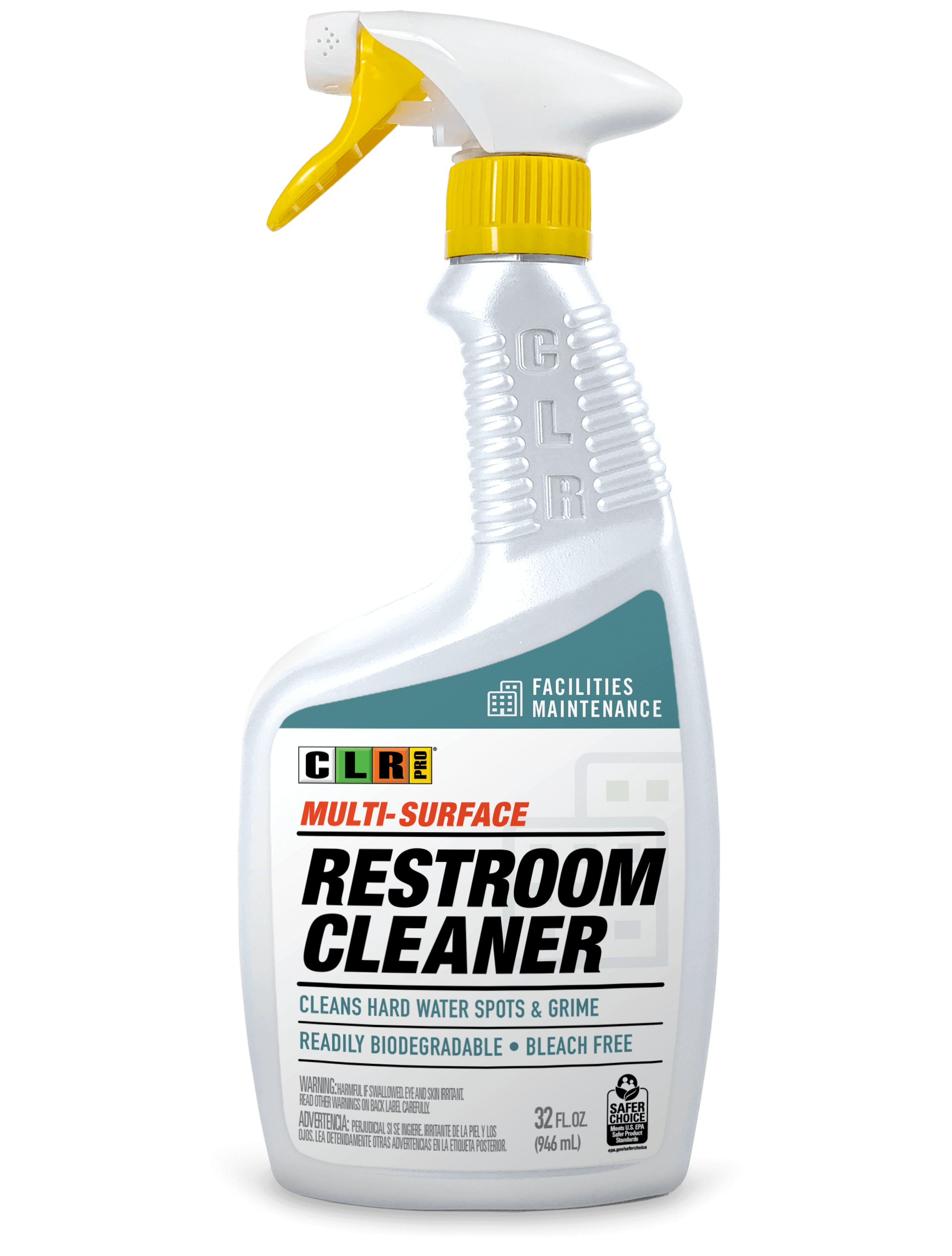
CLR PRO® Restroom Cleaner
Effective way to remove dirt, calcium, lime, hard water deposits, and soap scum in the bathroom.
- Multi-purpose cleaner that is designed for restrooms.
- Breaks down calcium, lime, hard water stains & soap scum to leave behind a streak-free shine.
- Ideal for hard surfaces including plastic, tile, stainless steel, glass, vinyl, granite, fiberglass, ceramic/porcelain sinks, bathtubs, shower doors & toilets.
- Safe for septic systems. It contains no ammonia, bleach, or phosphates.
- Part of the EPA’s Safer Choice Program recognizing the product as a safer alternative to harsh chemicals without sacrificing the quality or product performance.
- Manufactured in the USA.
Available In:
For use on these surfaces
- Ceramic
- Chrome
- Fiberglass
- Glass
- Granite
- Grout
- Plastic/Resin
- Porcelain
- PVC
- Stainless Steel Exteriors
How to use this product
- See SDS for precautionary instructions befre use.
- Spot test on an inconspicuous area before applying. Dwell time may vary by soil load.
- Rotate nozzle to ON position
- Apply product to surface, and wipe surface with damp cloth, sponge or brush.
- Rinse promptly and thoroughly with clean cold water.
Featured Video
Why CLR PRO® Facilities Maintenance Cleaning Products
Product ingredients

| Water | Dilutent: CAS #7732-18-5 | ||
| Dilutent: CAS #7732-18-5. Reverse Osmosis (RO) is a water treatment process that removes contaminants from water by passing the water through a membrane, (filter), where contaminants are filtered out yielding more pure quality water. | |||
| Lactic Acid | Chelating Agent: CAS #79-33-4. | ||
| Chelating Agent: CAS #79-33-4. Lactic acid is found in many yogurts and cheeses. It is also produced in the muscles during intense activity. Commercially, it is produced by fermentation of simple sugars. In cleaning products it functions as a chelating agent; a compound that makes metals more soluble in water. | |||
| Lauramine Oxide | Surfactant: CAS #1643-20-5. | ||
| Surfactant: CAS #1643-20-5. Used in cleaners to modify the surface tension of water, to aid in even spreading and to allow mixing with oil and dirt so that they can be rinsed away; it is included in many soaps, detergents, and several groups of antiseptics. | |||
| Tripropylene Glycol n-Butyl Ether | Solvent: CAS #55934-93-5. | ||
|
Solvent: CAS #55934-93-5. Used to slow down the evaporation of many liquid products including oven cleaners and inks for ball-point and felt-tip pens. It is very effective at absorbing organic material. California CPRKA Designated Lists (12) US NTP Reproductive or Developmental Toxicants. https://ntp.niehs.nih.gov/publications/monographs/index.html (16) California NLs. https://oehha.ca.gov/water/notification-levels-chemicals-drinking-water (18) California TACs. https://ww3.arb.ca.gov/toxics/id/taclist.htm (20) California Non-Cancer Hazards. https://oehha.ca.gov/air/general-info/oehha-acute-8-hour-and-chronic-reference-exposure-level-rel-summary |
|||

